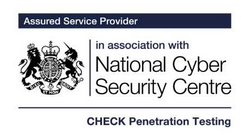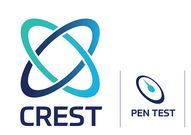
Penetration Testing as a Service
Identify vulnerabilities in your network, applications, and systems and create actionable insights to fortify your security posture.
What is a penetration test?
A penetration test, often referred to as a pen test, is a simulated cyber attack against your computer systems to check for exploitable vulnerabilities. Penetration testing plays a critical role in the protection strategy of any organisation. It helps identify weaknesses in your infrastructure, applications, or processes before they can be exploited maliciously, protecting your organisations reputation and the risk of huge costs.

Why Should Your Organisation Carry Out
Penetration Testing?
Cost Savings
The cost of a security breach can be enormous, considering the potential for intellectual property theft, data recovery expenses, legal liabilities, and more. Investing in penetration tests can save money in the long run by preventing such costly incidents.
Prevent Data Breaches
By identifying vulnerabilities before attackers can exploit them, penetration testing helps prevent breaches that could lead to significant costs, damages to reputation and irreversible consequences. Regular testing ensures that new vulnerabilities introduced by updates or new implementations do not leave your system exposed.
Compliance with Regulatory Requirements
Many industries are subject to regulations that mandate regular security assessments, including penetration testing. By complying with these regulations, your organisation not only avoids potential fines and penalties but also assures clients and stakeholders of your commitment to maintaining high security standards.
Protect Customer Trust and Corporate Image
Security breaches often lead to lost trust and diminished customer loyalty. By demonstrating a commitment to security through regular penetration testing, your organisation can enhance its public image and build stronger relationships with customers.
Types of Penetration Testing Services Offered
Network
Web Application
API
Cloud
Mobile
IoT (Internet of Things)
Why Choose SecQuest?
- Our consultants boast extensive expertise in security testing and network controls, accumulating over twenty years of frontline consulting experience with a leading global IT services corporation.
- Headquartered in the UK, we operate globally to cater to clients’ needs worldwide.
- All SecQuest consultants maintain current UK security clearance, ensuring the highest standards of security and confidentiality in our services.

Our Accreditations
Other Cyber Security Services
Network Security Assessment
SecQuest offers a comprehensive Network Security Assessment service designed to meticulously evaluate the security posture of your network. Our expert team employs cutting-edge tools and methodologies to identify vulnerabilities, assess potential threats, and analyse your network’s resilience against cyber attacks.
Application Security Assessment
SecQuest’s Application Security Assessment service is tailored to dive deep into the security framework of your applications, identifying vulnerabilities from the ground up. Our skilled professionals use a range of advanced testing techniques, including static and dynamic analysis, to uncover security flaws within your existing applications that could be exploited by attackers.
Internal Network Infrastructure Assessment
Our Internal Network Infrastructure Assessment service focuses on a thorough examination of your internal network, identifying vulnerabilities and potential security gaps within your IT infrastructure. Our experts will conduct an in-depth analysis, employing state-of-the-art techniques to evaluate the security of your servers, workstations, and network devices against best practices and known vulnerabilities.
Frequently Asked Questions (FAQ’s)
How long does a penetration test take?
The duration of a penetration test can vary significantly depending on several factors, including the complexity of the systems being tested, the scope of the test, the methods used, and the depth of the assessment required.
However, on average a standard penetration test for a medium-sized network might take anywhere from one to three weeks. However, the initial phase of understanding the scope and planning the test might take additional time before the actual testing begins.
How often should you get a penetration test?
The frequency with which you should conduct penetration testing can vary based on several factors, but here are some general guidelines to help determine how often your organisation might need penetration testing:
Standard Practice (Most Businesses):
For many businesses, conducting a penetration test once a year is sufficient to meet both regulatory requirements and to ensure a good security posture, unless significant changes or risk factors prompt additional testing.
High-Risk Industries (e.g., Finance, Healthcare):
Industries that deal with highly sensitive data, such as financial services or healthcare, may require more frequent testing due to the higher risks and stringent regulatory demands. Every six months or even quarterly tests are recommended.
After Major Changes (e.g., System Upgrades, New Implementations):
Any significant update to the IT environment, such as new software deployments, network expansions, or major system upgrades, should prompt a penetration test to ensure that new vulnerabilities have not been introduced.
What is the difference between Software Testing and Pentesting?
Software testing and penetration testing are distinct processes in the development and maintenance of software, each serving a unique purpose.
Software testing is primarily aimed at verifying that the software functions according to its specifications and is free of defects that could affect usability, functionality, or performance. It encompasses a variety of tests including functional, non-functional, regression, and user acceptance testing. This ensures that the software is reliable, performs efficiently, and meets the end users’ requirements.
Penetration testing, on the other hand, focuses specifically on identifying vulnerabilities in software and systems that could be exploited by malicious entities. This form of testing simulates cyber attacks to evaluate the effectiveness of security measures. It includes identifying potential security weaknesses, simulating exploits, and assessing the risks associated with successful attacks. Penetration testing provides critical insights into the security posture of systems and recommends mitigations to enhance defences against real-world attacks.
Cyber Security Sectors We Cover
Looking for more information for your line of business? Browse our sector-specific pages below.
Can’t see your sector? Don’t worry, you can reach out for more sector-specific information by clicking below.
Additional Resources
-

What is Cyber Threat Intelligence? Understanding its Role in Security
What is Cyber Threat Intelligence? Cyber Threat Intelligence (CTI) refers to the collection, analysis, and circulation of knowledge…
-

What is Network Security? Understanding industry standards and best practices
What is Network Security Network security can be defined as the safeguard and protection of networks and systems…
-

The Impact of AI on the Cyber Security Industry
Introduction ChatGPT, an AI powered chatbot, built to push the envelope in natural language processing capabilities, has fascinated…











